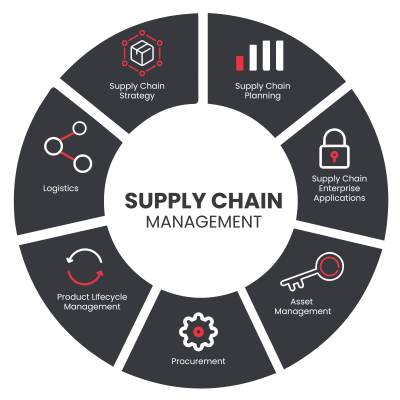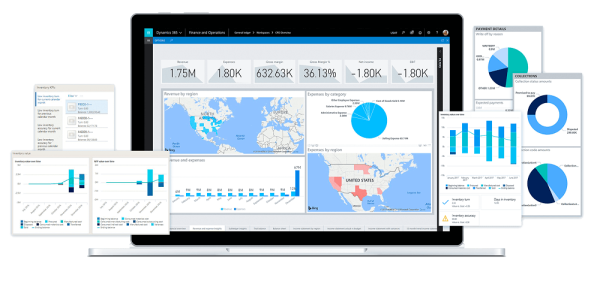
 Microsoft Dynamics 365 for Finance and Operations, formerly known as Dynamics AX, is an enterprise resource planning (ERP) solution that is part of the Microsoft Dynamics 365 suite of business applications. It is designed to help businesses manage their financials, supply chain, manufacturing, and human resources processes in a unified platform. This ERP system is part of the larger Microsoft Dynamics 365 suite, which includes various other applications for sales, marketing, customer service, and more.
Microsoft Dynamics 365 for Finance and Operations, formerly known as Dynamics AX, is an enterprise resource planning (ERP) solution that is part of the Microsoft Dynamics 365 suite of business applications. It is designed to help businesses manage their financials, supply chain, manufacturing, and human resources processes in a unified platform. This ERP system is part of the larger Microsoft Dynamics 365 suite, which includes various other applications for sales, marketing, customer service, and more.
Here are some key features and capabilities of Microsoft Dynamics 365 Finance and Operations:
Financial Management: It provides tools for managing general ledger, accounts payable, accounts receivable, cash and bank management, budgeting, and financial reporting. It helps organizations streamline their financial processes and gain better insights into their financial health.
 Supply Chain Management: The solution includes features for supply chain planning, procurement, inventory management, warehouse management, and transportation management. It helps optimize supply chain operations and enhance visibility into the movement of goods and materials.
Supply Chain Management: The solution includes features for supply chain planning, procurement, inventory management, warehouse management, and transportation management. It helps optimize supply chain operations and enhance visibility into the movement of goods and materials.
Manufacturing: Microsoft Dynamics 365 Finance and Operations support various manufacturing processes, including production planning, bill of materials, shop floor management, and quality control. This is valuable for organizations involved in production and manufacturing.
Human Resources: It includes human resources and payroll functionality, helping organizations manage employee records, benefits, payroll processing, and compliance with labor regulations.
Project Management and Accounting: This module is useful for project-based organizations and includes project accounting, time and expense management, and resource management.
Business Intelligence and Reporting: The system provides robust business intelligence and reporting capabilities, including built-in Power BI integration, enabling users to create custom reports and dashboards to analyze data.
Integration with Other Microsoft Products: Microsoft Dynamics 365 Finance and Operations can seamlessly integrate with other Microsoft solutions, such as Office 365, Power Apps, Power Automate, and Azure services, providing a comprehensive ecosystem for business processes.
Cloud-Based: It is offered as a cloud-based solution, which means it can be accessed from anywhere with an internet connection. This cloud-based architecture also enables regular updates and maintenance by Microsoft.
Scalability: Microsoft Dynamics 365 Finance and Operations is suitable for both small and large enterprises, offering scalability to meet the needs of growing organizations.
Industry-Specific Solutions: Microsoft offers industry-specific solutions and templates to address the unique needs of various industries, such as retail, manufacturing, and professional services.
Overall, Microsoft Dynamics 365 Finance and Operations is a comprehensive ERP solution that aims to improve the efficiency and effectiveness of an organization’s financial and operational processes. It can be customized to meet the specific needs of different industries and organizations, making it a popular choice for businesses looking to modernize their ERP systems.
Why Choose Dynamics 365 Finance & Operations?
 There are several reasons why you might choose Microsoft Dynamics 365 Finance and Operations for your business. Here are some key advantages and reasons to consider:
There are several reasons why you might choose Microsoft Dynamics 365 Finance and Operations for your business. Here are some key advantages and reasons to consider:
Comprehensive ERP Solution: Dynamics 365 Finance and Operations is a comprehensive enterprise resource planning (ERP) solution that covers a wide range of business processes, including financial management, supply chain management, manufacturing, human resources, and more. This comprehensive coverage means you can manage all aspects of your business within a single system, leading to greater efficiency and data integration.
Scalability: Dynamics 365 Finance and Operations is designed to accommodate businesses of varying sizes, from small and midsize enterprises to large multinational corporations. It can scale as your business grows, ensuring that the system continues to meet your evolving needs.
Cloud-Based: Being a cloud-based solution means you can access Dynamics 365 Finance and Operations from anywhere with an internet connection. This flexibility enables remote work, and accessibility on mobile devices, and eliminates the need for maintaining on-premises servers and infrastructure.
Regular Updates: As a cloud-based offering, Microsoft provides regular updates and improvements to the software. This ensures that your ERP system remains up-to-date with the latest features, security enhancements, and compliance requirements without the need for costly and time-consuming on-premises upgrades.
Integration with Other Microsoft Products: Dynamics 365 Finance and Operations seamlessly integrates with other Microsoft products, such as Microsoft 365 (formerly Office 365), Power Platform, and Azure. This integration allows for a cohesive ecosystem of business applications and services.

Customization and Extensibility: You can customize and extend Dynamics 365 Finance and Operations to meet your specific business requirements. Microsoft provides development tools like PowerApps and Flow, and you can also leverage the Microsoft Power Platform for low-code/no-code customization.
Global Capabilities: If your business operates internationally, Dynamics 365 Finance and Operations is designed to support multi-currency, multi-language, and multi-country requirements. It can help you manage global operations more efficiently.
Security and Compliance: Microsoft invests heavily in security and compliance measures, ensuring that your data and operations are protected. The software complies with industry standards and regulations, making it suitable for businesses in various sectors.
Support and Ecosystem: Dynamics 365 Finance and Operations benefits from Microsoft’s extensive support network, including a network of partners and consultants who can help with implementation, training, and support.
Cost Efficiency: By centralizing your business processes and streamlining operations, Dynamics 365 Finance and Operations can lead to cost savings through improved efficiency, reduced manual processes, and better decision-making.
Ultimately, the choice of Dynamics 365 Finance and Operations depends on your specific business needs, size, and goals. It’s important to conduct a thorough evaluation and consider how the features and capabilities align with your organization’s requirements before making a decision.
We Make Your Life Better
Let Us Know, How Can We Assist You?
Dynamics 365 Finance & Operation Pricing

Licensing Model:
- Dynamics 365 Finance and Operations is typically licensed on a per-user, per-month basis. There are various user types, including full users and self-service users, each with different access rights and capabilities.
- Full users are those who need extensive access to the system and are typically more expensive.
- Self-service users have limited access and are usually less costly.
Dynamics 365 Edition:
- Dynamics 365 Finance and Operations comes in multiple editions, such as Finance, Supply Chain Management, and Unified Operations Plan, each tailored to specific business needs.
- The edition you choose will impact pricing, as different editions offer varying levels of functionality.
Cloud Deployment vs. On-Premises:
- Cloud-based (SaaS) deployment is the most common and provides the benefits of regular updates and remote accessibility. It is typically subscription-based with monthly or annual payments.
- On-premises deployment is less common and involves upfront licensing costs. It also requires ongoing maintenance and may not have the same rapid update cycle as the cloud version.

- The number of users you need to license will have a significant impact on your overall cost. Microsoft typically offers volume discounts for larger user counts.
Additional Modules and Features:
- Dynamics 365 Finance and Operations offers various add-on modules and features that can extend its functionality. The cost of these modules is typically added to the base licensing fees.
Support and Maintenance:
- Support and maintenance costs may be included in your licensing fees for cloud-based deployments. For on-premises deployments, you may need to budget separately for ongoing support and maintenance.
Implementation Costs:
- In addition to licensing fees, you should budget for implementation costs, which can include consulting services, training, and customization to tailor the system to your specific business processes.
It’s important to note that Microsoft often offers special promotions and pricing bundles, especially for new customers or when transitioning from older versions of their ERP solutions like Dynamics AX.
